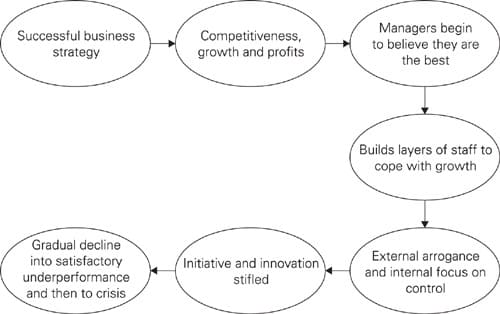The idea of “satisfactory underperformance” from Prof Sumantra Ghoshal is so deceptively simple and profoundly impactful. We often get stuck in the self-construction of reality and naively believe that we are clearly the “best” that is on offer! I applied this lens to how we as individuals behave – often build a false moat of inflated egos around ourselves, and naively and rather pompously believe that rest of the world is at fault. We have an “obvious” and a “reasonable” explanation why we couldn’t be better than what we already are – in fact, those sins that others point out in us are more like the battle scars and despite all those flaws, we are clearly doing so well!
Such beliefs stem from initial success – quite often from serendipity or plain luck (and yes, many a times from sheer talent and hard work too – which could lead to yet another problem of arrogance of already knowing it all!) that soon are mistaken for competency, but the subsequent behaviors could then lead a company into a vicious cycle of that eventually declines in #satisfactoryunderperformance before irreversibly deteriorating into a full-blown crisis. The picture below describes the process well:

Ghoshal describes some ideas on how a company could reverse the process. I felt it was interesting to take the same principles and apply them to people – same lens but view people instead of companies. It made a lot of sense. Here’s my take on how we could interpret for ourselves what Ghoshal said for organizations:
- High performance companies exist in “unattractive” industries – similarly, doesn’t matter if one is in customer service, or sales or support, or any other function that people often consider as unattractive or boring. There’s always a high performance in every role and function! And those best performers don’t either consider those roles as unsexy, or even if they do, they allow their opinions to get in the way of their performance. They simply take the task at hand and deliver the best they can – and then push themselves some more!
- A company can achieve outstanding performance even when its industry is shrinking – while it might sound like a tail trying to wag the old dog to keep up the dog and pony show, but lackadaisical performance by an individual can’t be an acceptable substitute for a company that might otherwise is doing down the drain! The company is only as good as the people who work for it, and the real talent, skill and capabilities come to fore only when the chips are down! Anyone can claim to be successful high-performer when there are fair winds, however the real sailors sail in tough storms!
- Outstanding performance can be achieved even when competitors are much bigger and stronger – top companies often have very high-performing talent pool. This is often seen as a limiting factor, for there can only be one goalkeeper on a team! However, top performers don’t allow that “zero sum” mentality to curtail their ambitions and limit their performance. One doesn’t need to come from a celebrated Ivy League background, nor have the perfect charmer personality. In fact, being an underrated (even better – being “invisible) pony could be a significant advantage for one to gradually chip away and build something of true value while the world is busy not paying attention to them!
- Radical performance improvement is possible even when you are already very successful – the hare lost the race because he overtook the tortoise and decided that good was good enough! There is something very deceptively seducing about “early success” that makes the best of us succumb to the mindset of “I am the best” and stop trying hard(er). We forget that the reason we succeeded was not simply because because we were awesome but most likely we were awesome because we worked so very hard at it! The correlation is often confused with causation!
- Charismatic leadership is not a prerequisite for radical performance improvement – one clearly doesn’t need to have very flashy and extrovert party-type personality in order to perform! Diamonds are always found rough, and even though they are among the hardest substances found on earth, they respond gracefully to feedback in the form of cutting and polishing, and gradually emerges a solitaire! Similarly, we are all equally raw – just that some are a bit further ahead on the racetrack. But then, this is not a race with podium finish…this is a race where each one of us needs to win our own race without necessarily competing with one another.
Conclusion
The authors very rightly call it is as a “corporate disease… It is a pervasive disease – we have confronted it in companies all over the world. It is a disease that is very easy to catch – indeed, finding a way to avoid it is the unnatural act.” I found it so tempting – and rather easy – to apply it to look at ourselves – at myself – and see how I have so easily fallen into my own self-made trapping pits. Hopefully it helps you too!












